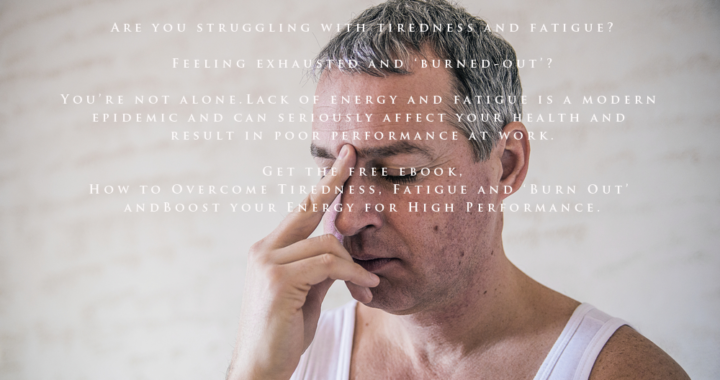If you wake up on a Monday morning and your first thought is why am I so Tired All The Time, I understand.
It happened to me and in my early forties I ended up in Hospital almost ‘Burnt-out’.
In the UK recent surveys suggest that approximately 25% of all visits to the Doctor are due to Tiredness and fatigue.
GP’s even use the acronym TATT on request forms for further investigations.
So why are we so tired all the time?
The Director of fatigue research at Newcastle University, UK, Professor Julia Newton, suggests that people fall into 1 of 3 groups that follow a bell shaped curve. What statisticians call a normal distribution!!
At the left side of the curve there are people who need to get some sleep, and at the other end there are people with a disease that causes fatigue.
The majority of people fall into the middle group, which is caused by a combination of environmental and lifestyle factors.
If you’ve been suffering with tiredness and fatigue for a few weeks or months and you’ve been to your GP for a routine check and your doctor’s found ‘nothing wrong’.
Then read on because in this post I’m going to discuss why a lack of sleep is causing tiredness and fatigue plus 8 simple but powerful solutions to help you overcome this.
Why do we need sleep?

The human body is a dynamic organism that performs a continual balancing act of breaking down, catabolism and building up, anabolism.
Our body’s ability to sustain this balance between catabolism and anabolism allows us to make adaptive changes that are necessary for our survival.
And although we are able to perform this function during the day.
Sleep is an incredibly essential component to this complicated process.
The importance of our Circadian Rhythm
Life on earth evolved in tune with the daily rhythm of night and day or light and dark. Almost all life has their metabolic processes synchronized to a 24-hour clock.
These internal biological or circadian clocks make it possible for us to coordinate our biological functions and our behaviour with the day and night cycle.
What happens when this becomes disrupted, and we are deprived of sleep?
A disrupted circadian rhythm leads to dramatically increased rates of disease, increased body fat, reduced lifespan, and fatigue.
We have special circadian clock genes, e.g. SIRT1 that control signaling proteins and these are intimately linked with your energy levels.
If you have low levels of these proteins your mitochondria, (the power units of each cell), don’t work very well. The result is you struggle with constant low energy.
In 2007 Karine Spiegaland1 and colleagues carried out a series of studies that showed that after 5 nights of restricted sleep, the ability of 11 young fit men, to clear glucose from the blood, (normally carried out by the hormone insulin), was reduced by 40%.
In other studies, she found that Ghrelin, (the appetite stimulating hormone), had increased by 28%.
The hormone leptin, (leptin decreases hunger by signaling the brain that there is no need to eat), was decreased by 18%.
This research supported by more than 50 other studies, showed a strong association between a lack of sleep, Obesity and even type 2 diabetes.
Whenever I talk to clients about their sleep I usually get the same answer, ‘well I always get 7 or 8 hours’.
When I start to ‘dig a little deeper’ I find that the actual amount of restorative and nourishing sleep they get each night is much less.
They usually end up with between 5 or 6 hours due to poor sleep hygiene, which disrupts their circadian rhythm. So even those hours they do get maybe disturbed and NOT restorative.
This is a major contributor to all disease and to a severe lack of energy.
When YOUR Circadian rhythm is disrupted it becomes almost impossible to improve your energy levels. Even if you make positive changes to your diet, increase the amount you exercise or manage your stress better.
Here are 8 strategies to optimize your circadian rhythm and ensure you get enough sleep
- Go to bed at the right time. The most beneficial hormonal secretions and recovery happen between 10pm and 2am.
- Are you a night owl? Work out your chronotype, this is essentially whether you are more of a morning type or a night type. You can go online and take the Horne Ostberg questionnaire here: This questionnaire is based on scientifically validated research. Also read ‘The Power of When’ by Dr Michael Breus.
- Block out blue light after sunset. Blue light will suppress the production of melatonin and other hormones such as Growth hormone and Prolactin. This will not only result in low energy throughout the day but poor health.
- Allow 3 hours after food before going to bed. This will ensure proper leptin signaling in the brain. Insulin disrupts this process, which is one of the reasons for weight gain.
- Control your sleep environment. Make sure its as dark as possible. There is no sound and the temperature is cool. When you use temperature to enhance your circadian rhythm you deepen your sleep at night and improve your energy levels throughout the day.
- Control and manage stress*, stress hormones delay your circadian rhythm.
- Get movement first thing in the morning.
- Get bright light in the morning. Exposure to bright light early in the day boosts our energy levels and our mood.
Sleep deprivation and poor sleep hygiene leading to a disrupted circadian rhythm are just two of the reasons we experience tiredness and fatigue.
*I cover all this in a lot more detail in my BOOK: ‘How to Overcome Tiredness, Fatigue, Stress and BurnOut and Boost your Energy for High Performance’.

